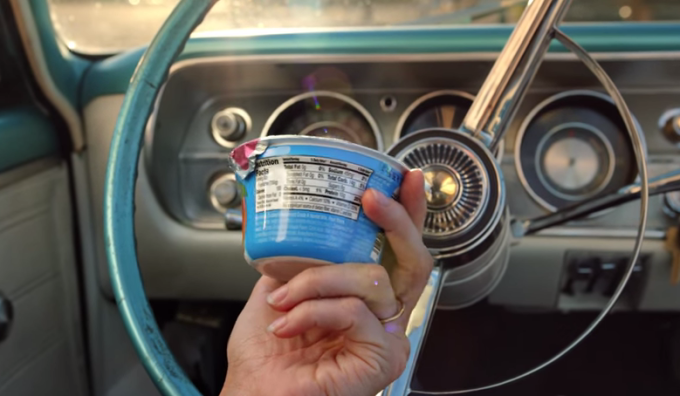Chobani Can’t Run Ads Claiming Other Greek Yogurt Products Contain Bug Spray, Chlorine
 A federal court has ordered the makers of Chobani Greek yogurt to stop running a series of new ads that claim similar products from Dannon and Yoplait contain insecticides and chlorine.
A federal court has ordered the makers of Chobani Greek yogurt to stop running a series of new ads that claim similar products from Dannon and Yoplait contain insecticides and chlorine.
According to the Minneapolis Star-Tribune, U.S. District Court judge ruled today that General Mills’ Yoplait brand could be “irreparably harmed” by a Chobani ad which refers to the common preservative potassium sorbate as “bug spray.”
Judge David Hurd found that General Mills demonstrated that it could be “irreparably harmed” by Chobani’s ads and that the company would have a “substantial likelihood of success on the merits of its false advertising campaign.”
In his decision, Hurd wrote that, according to U.S. Department of Agriculture, “few substances have the kind of extensive, rigorous long-term testing that sorbic acid and its salts (like potassium sorbate) have had. It has been found to be nontoxic even in large quantities.”
General Mills sued [PDF] Chobani for false advertising earlier this month related to its new marketing strategy.
The ad campaign, which debuted Jan. 6, includes TV commercials, print advertisements in major newspapers, coupons, and a presence at fitness gyms that target other yogurt brands with similar 100-calorie options, including Yoplait and Dannon.
In the ad, Chobani notes that the Yoplait Greek-style yogurt contains the commonly used preservative potassium sorbate. But then the ads goes on to imply that this ingredient is actually a pesticide, saying it is “used to kill bugs.”
“The television commercial that leads the Chobani attack campaign goes so far to convey that, because Yoplait Greek 100 is laced with a pesticide, it is so dangerous and unfit to eat that consumers should discard it as garbage,” the suit states.
The TV spot prominently displays Yoplait Greek 100, with a woman examining the package. At this point a voiceover states, “Yoplait Greek 100 actually uses preservatives like potassium sorbate.”
The narration then continues, “Really?! That stuff is used to kill bugs!” During this exchange, the woman’s face is pinched in a look of disgust as she further examines the Yoplait container; she then flings the container into the garbage.
General Mills contended that Chobani falsely claims that Yoplait is “toxic” because it contains potassium sorbate, a fungicide-like preservative that prevents yeast and mold growth.
“General Mills is informed and believes that there is no scientific evidence that potassium sorbate is effective against insects,” the company said in the suit, noting that potassium sorbate is considered safe by multiple federal agencies, according to the lawsuit.
The suit also took issue with Chobani’s print and website advertisements for its 100-calorie yogurt. The print ads include references to “bad stuff” — preservatives — in General Mill’s Yoplait yogurt, while the Chobani website allegedly “falsely communicates that the potassium sorbate should be considered a ‘pesticide’ by consumers.”
General Mills claimed in the suit that it has spent more than $900 million in marketing and advertising for its Yoplait products in the past five years and that Chobani’s campaign could do irreversible damage to the brand.
“The offending ads are therefore both literally false by necessary implication and highly misleading,” the suit states. “Unless Chobani is immediately enjoined, the Chobani Attack Campaign will irreparably harm General Mills and the goodwill it has developed over several years.”
General Mills tells the Star Tribune that it is pleased with the court’s ruling.
“General Mills supports fair and vigorous competition between companies, but false advertising only misleads and harms consumers,” the company said in a statement.
Chobani released a statement shortly after the ruling was announced, saying it was “disappointed” by the decision, but would continue to “spread its message about the value of selecting natural ingredients.”
“This is not a marketing campaign, it’s a mindset campaign, and it outlines the difference between using only natural ingredients versus artificial ingredients,” Peter McGuinness, Chief Marketing and Brand Officer, Chobani, said in a statement. “We’re committed to continuing the conversation and it’s good to see big food companies like General Mills starting to remove artificial ingredients from some of their products, like their cereals. In the end, if we can give more people more information while helping other food companies make better food, everyone wins.”
General Mills’ lawsuit came less than a week after Dannon threatened to sue Chobani over claims that its Light & Fit product contains sucralose, an artificial sweetener processed with “added chlorine.”
Before Dannon could head to court, Chobani sued the company in New York federal court asking for a declaration that its claims don’t constitute false and deceptive advertising. Dannon promptly countersued.
In a separate ruling Hurd barred Chobani from running similar ads that targeted Dannon’s Light & Fit Greek yogurt, claiming the product contained sucralose, an artificial sweetener processed with “added chlorine.”
Judge bars Chobani ads critical of ingredients in Yoplait, Dannon yogurts [Star Tribune]
Want more consumer news? Visit our parent organization, Consumer Reports, for the latest on scams, recalls, and other consumer issues.

